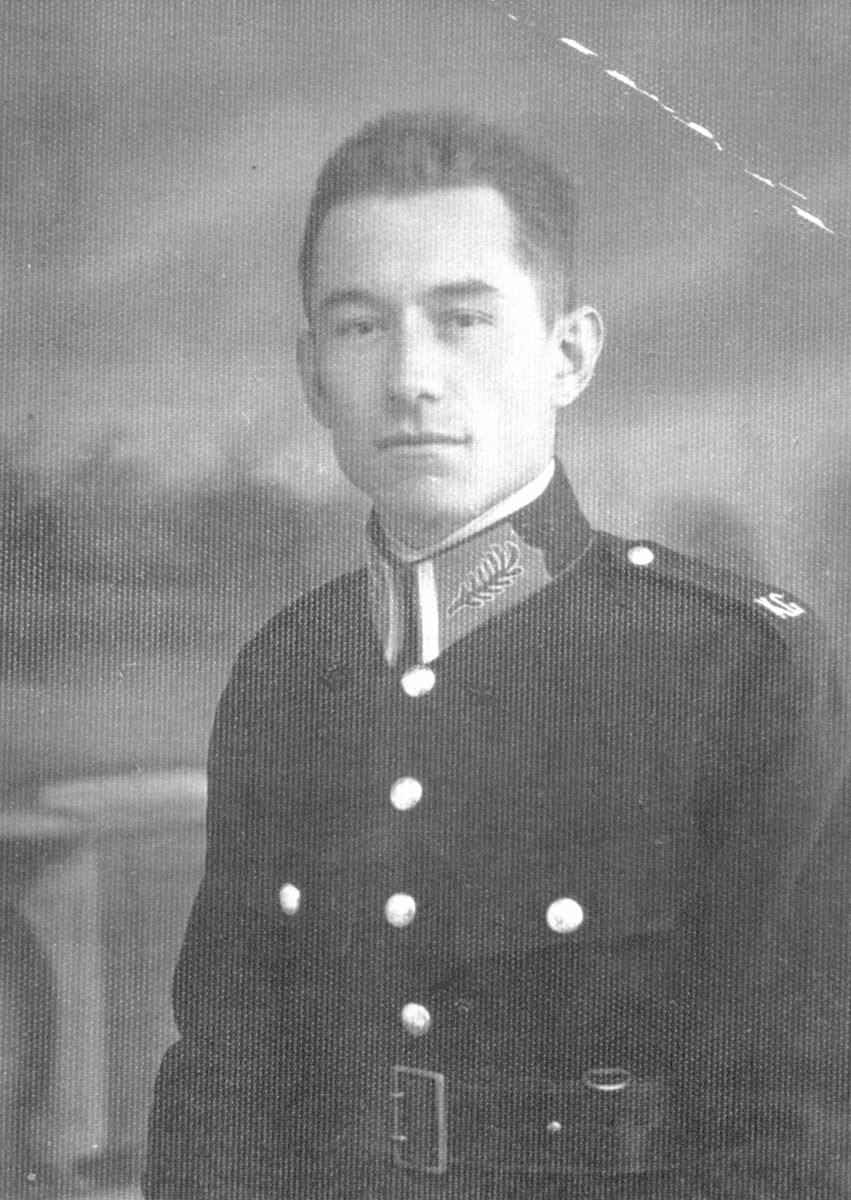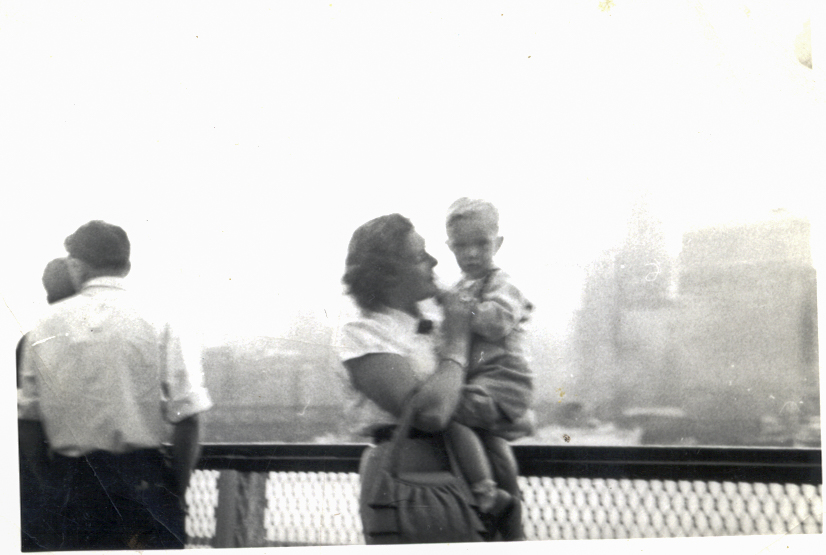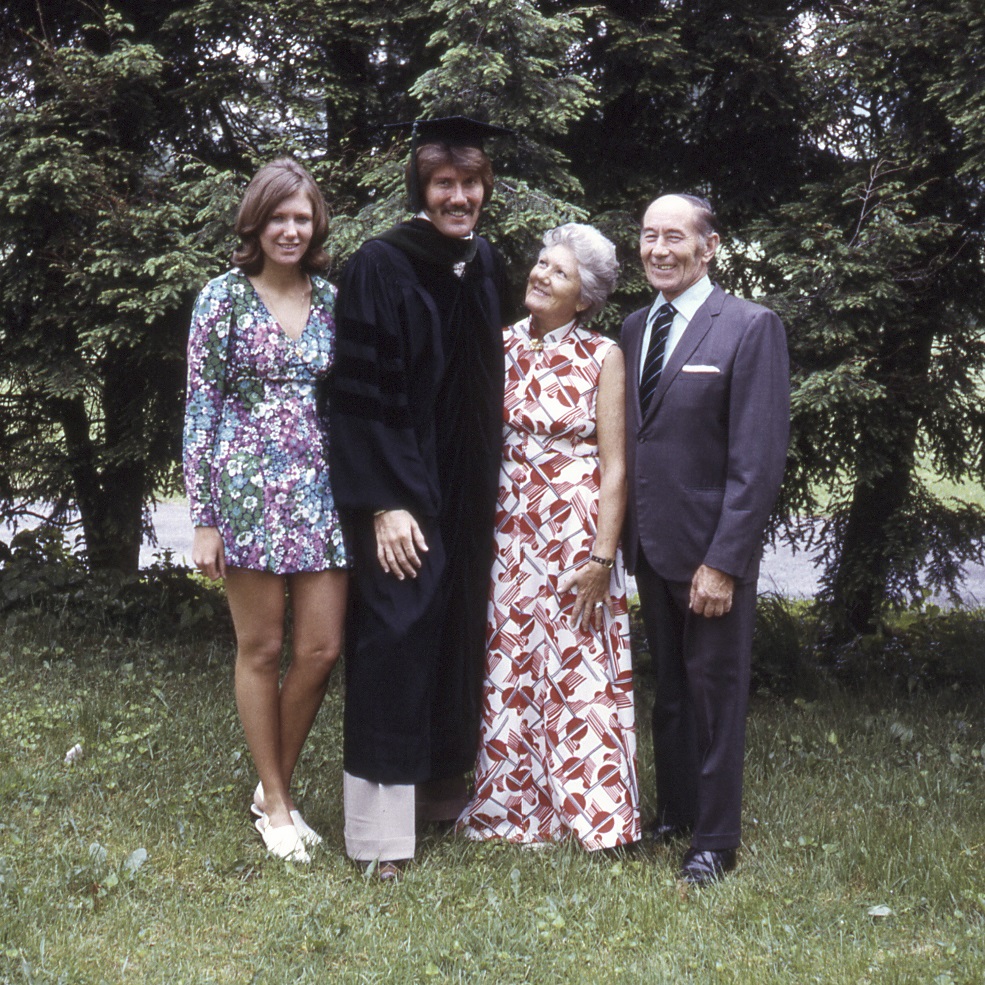How do you honor your parents’ unwavering commitment to your dreams and their remarkable legacy of strength and tenacity while simultaneously building a legacy of your own that lays a foundation for future generations? Lewis Katz School of Medicine alumnus and accomplished orthopedist John R. Duda, MD ’74, found himself reflecting on these profound questions in October 2023. When a casual dinner conversation at a non-profit event turned to fundraising, inspiration struck. “A lightbulb went off,” he said. “This is how I would honor my parents and their incredible story. I can help open those same doors that they opened for me.” The result is the Duda-Frank Scholarship, which will cover all four years of its recipients’ medical education.
“With this incredible gift, Dr. Duda has inextricably tied his family’s legacy to the future of purposeful medicine,” says Amy J. Goldberg, MD, FACS, the Marjorie Joy Katz Dean of the Katz School of Medicine. “His generosity and shared commitment to creating opportunities for students to pursue their calling is building the momentum that will change medicine for the better.”
An apt adjective for the gift and its impact on its student recipients, “incredible” is not quite enough to describe his parents’ story.
Love and Survival
Halina Frank grew up in Tarnów, a small city in southeastern Poland. Stanley Duda came from Widełka, a village about 30 miles away. Despite the short distance between them, their lives couldn’t have been further apart. Halina’s Jewish family ran a successful lumber import/export business as well as a popular local restaurant, while Stanley’s family were impoverished Catholic farmers.
Stanley found work as a police officer in the city of Tarnów, assisting with business licensing and inspections. When Halina walked in one day, looking to renew a license, Stanley fell in love at first sight. Halina remained coy on the subject knowing her family would not approve. Class mattered then, and theirs were clearly mismatched. Determined to bridge the gap, Stanley convinced his employer to pay his tuition at a local university, where he studied law to improve his financial and social standing.
 Two years into his studies, World War II broke out. Stanley became a leader in a local underground resistance group, while Halina was sent to a ghetto in Tarnów. When Stanley learned that the prisoners in the ghetto were to be moved to Nazi concentration camps, he and his group hatched a plan to rescue Halina.
Two years into his studies, World War II broke out. Stanley became a leader in a local underground resistance group, while Halina was sent to a ghetto in Tarnów. When Stanley learned that the prisoners in the ghetto were to be moved to Nazi concentration camps, he and his group hatched a plan to rescue Halina.
Under the cover of darkness, she was taken to a nearby safe house. And then another. For the duration of the war, Stanley and Halina moved among a network of safe houses in southern Poland and southwestern Germany, always staying a step ahead of the Nazis. Stanley had most certainly saved Halina’s life, and soon she would reciprocate. Halina spoke fluent German, after working as a nanny for a German family. At one point during their escape the pair found themselves on a train with approaching Nazi soldiers sent to verify the passengers’ papers. She warned Stanley to remain silent, then told the men that he was her deaf, mute brother. Miraculously, the soldiers let the two pass.
When the war ended, they married. The young family then immigrated to the United States when their son John was only two. It was 1950. They arrived at Ellis Island with only a few simple possessions, having left behind virtually everything they owned and everyone they knew. They moved in with Stanley’s sister in Philadelphia’s Fishtown neighborhood. Stanley got a job as a dishwasher at a diner in Willow Grove. Halina worked as a cashier at Willow Grove Park by day and as a printer/packer at SPS Enterprises in Jenkintown by night. Providing a secure future for their family was the priority, and their hard work, sacrifice and commitment built the solid foundation that empowered their children to go after their dreams.
 “As a kid, I didn’t fully appreciate all they’d gone through and how much they had sacrificed. I was too busy trying to fit in, moving beyond my immigrant status and becoming an American, just like all my friends,” Dr. Duda says. “As an adult I slowly began to comprehend the enormity of my parent’s journey. A strong desire to properly honor them became a transcendent personal ambition. And what better way than by providing an otherwise absent opportunity for deserving students who, like my parents, have also overcome adversity to achieve their dream of becoming a physician.”
“As a kid, I didn’t fully appreciate all they’d gone through and how much they had sacrificed. I was too busy trying to fit in, moving beyond my immigrant status and becoming an American, just like all my friends,” Dr. Duda says. “As an adult I slowly began to comprehend the enormity of my parent’s journey. A strong desire to properly honor them became a transcendent personal ambition. And what better way than by providing an otherwise absent opportunity for deserving students who, like my parents, have also overcome adversity to achieve their dream of becoming a physician.”
The Makings of a Great Physician
Dr. Duda says that he cannot remember a time in his life when he did not want to be a physician. His interview at Temple was with Dr. Elizabeth Lautch. Having been through several medical school interviews already, he was prepared to answer questions on his GPA, MCATS and why he elected to take College Physics in summer school. Dr. Lautch instead asked if he wanted a cup of coffee, briefly looked at his file, slammed it shut and asked: “Tell me about your childhood and what it was like growing up in Willow Grove with immigrant parents.” A scheduled twenty-minute interview stretched to over an hour, after which Dr. Lautch rose from her chair, shook his hand and said: “I think you should be a doctor.” A few weeks later when he retrieved his Katz School of Medicine acceptance letter from his parents’ mailbox, he knew “Temple had made my dream come true.”
During his clinical clerkship progression, Dr. Duda developed a strong connection with Dr. John W. Lachman, then-Chair of the Department of Orthopaedic Surgery. Originally planning to become a family physician, Dr. Lachman inspired him to pursue his specialty. During one of their conversations Dr. Lachman suddenly said: “John tomorrow I want to drive you home after class and meet your parents!” Upon arriving at their home Dr. Lachman turned to him and said: “Please introduce me to your parents…and then get lost.” After an hour and a half, he left waving good-bye without saying a word to his student. A week later, Duda was offered a highly sought-after position in his residency program. Although he declined that offer, Dr. Lachman was graciously instrumental in helping him secure a position in the University of Pennsylvania’s residency program. Dr. Lachman’s and Temple’s steadfast belief in him, his abilities and potential again helped forge his path forward.
When the time came for the pieces to fit together, the decision to build a philanthropic legacy through establishing a scholarship at the Katz School of Medicine became self-evident. Throughout his time at the school and in his interactions with it since, Dr. Duda, who attended his 50th reunion over Reunion & Alumni Weekend in April, says Temple has been an institution sincerely and unwaveringly focused on the humanity of its students. He believes that humanity and its associated attributes—compassion, empathy, and kindness—are what differentiate a good physician from a great one.
“I’ve always felt a connection to Temple because I closely identify with its values,” he says. “I’m here today because of its insistence on looking beyond traditional algorithms of GPAs, MCATs and checking off the boxes of medical admissions orthodoxy; to reveal and identify passionate learners, with character traits that go beyond and above. It was Temple’s commitment to expose that humanity beneath the numbers and its willingness to engage in the quest that distinguished Temple from its peers, and provided me the opportunity to study medicine and reap the intangible rewards of serving our community.”
‘They Can’t Do It Alone’
 The Duda-Frank Scholarship, founded with Dr. Duda’s $1 million gift, will be awarded to an exceptional student who embodies the resilience, work ethic, and ability to overcome emotional and financial adversity that Dr. Duda’s parents exemplified. It also represented an opportunity to make that generosity go even further.
The Duda-Frank Scholarship, founded with Dr. Duda’s $1 million gift, will be awarded to an exceptional student who embodies the resilience, work ethic, and ability to overcome emotional and financial adversity that Dr. Duda’s parents exemplified. It also represented an opportunity to make that generosity go even further.
As part of Temple University’s Made for More: Prioritizing Scholarships at Temple fundraising initiative, the university is matching $50,000 to the gift’s principal. Launched in January, the three-year, $125-million campaign is designed to create new scholarships and, in the process, make a Temple education more affordable for current and future students.
Made for More, as described by the university, “is an ambitious fundraising initiative rooted in the underlying belief that our students are the trailblazing leaders of tomorrow. Determined, curious, and driven to solve society’s greatest challenges, a new generation of Owls is ready to catalyze meaningful, lasting change. Our students know they are ‘Made for More,’ but they can’t do it alone.”
As part of the initiative, all new endowed scholarship gifts of $50,000 and greater made before January 1, 2027, are eligible for a tiered match. Match funds will come from the university president’s discretionary fund, which is supported by anonymous donors. And for Dr. Duda, the more encouragement his gift can bring to others to do the same, the better. “Providng a future student the same opportunity I had to pursue a career in medicine is incredible and deeply rewarding. But I want this gift to do more. I would like it to influence my fellow alumni and hopefully encourage future donors to make their impact.”
That message resonates with Dean Goldberg, a vocal advocate for scholarship support – the school’s top philanthropic priority – and a scholarship donor herself. At the Annual Celebration of Scholarship Dinner in March, Dr. and Mrs. Duda’s first, she noted the importance of generosity inspiring generosity. “Generosity builds momentum,” she said. “Scholarship support does more than pay forward the opportunity to pursue a Temple medical education. It is an invitation – and hopeful charge – for others to honor the people who have made a difference in their lives in this extraordinary way.
---
Dr. Duda’s remarkable gift reflects his steadfast commitment, shared by the Katz School of Medicine, to open the doors of opportunity for the next generation of purpose-driven physicians. Inspired by his parents' determination and resilience, his scholarship honors their legacy by empowering future medical students with the same chance to follow their dreams to success.
“My dad always dreamed of owning his own greenhouse, and it was my only surviving maternal cousin (Robert Frank, age 14 when rescued from Mathausen Concentration Camp) who supplied the funding,” said Dr. Duda. “Dad supplied the sweat equity, but it was Robert’s financial contribution that enabled his dream to materialize. Life’s journey is arduous and none of us successfully navigate it alone. So, what if this comes full circle? And now I contribute to making someone else’s dream come true. By honoring my parents and my one other Holocaust surviving family member; by funding a Temple medical education for a deserving candidate and giving them the opportunity to also become a part of this incredible community. That crystallized everything for me.”
Photos: 1, Stanley Duda, ca. 1940 ; 2, Halina and young John, New York harbor, 1950; 4, Halina and Stanley Duda.

